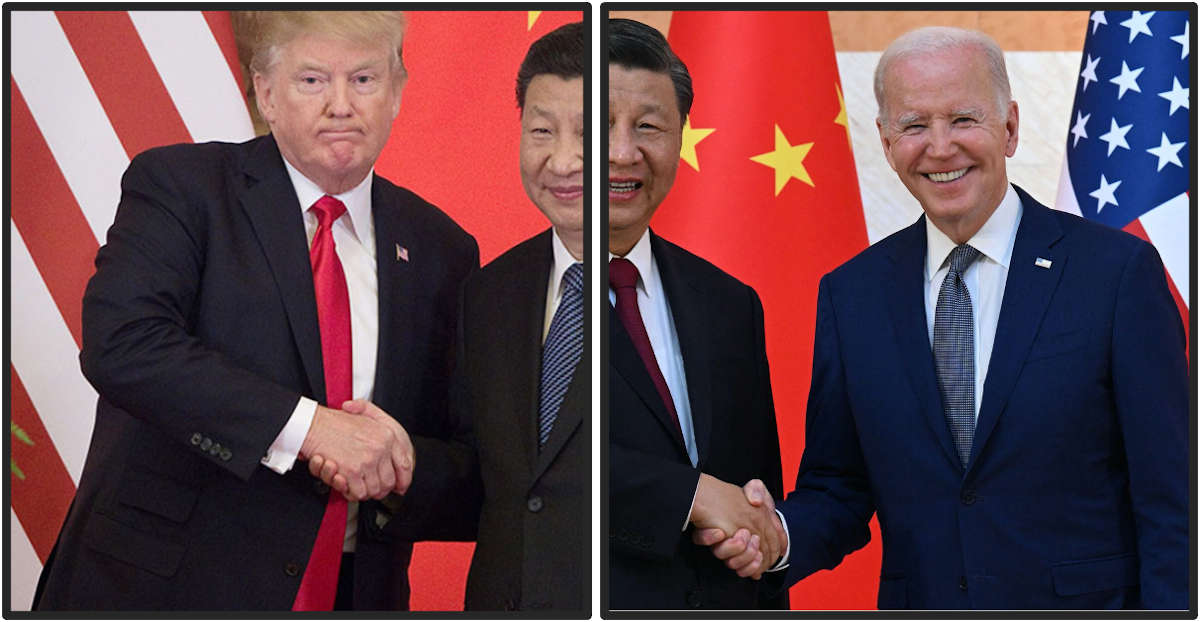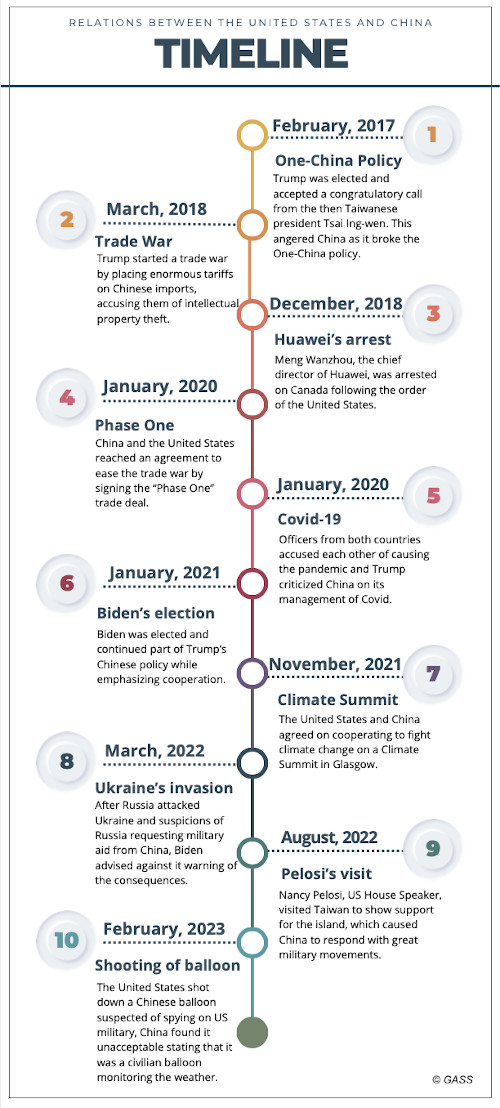In the image
US Presidents Trump and Biden meeting with President Xi of China
The next United States elections, scheduled for November 5th, 2024, are especially important not only for the US but for the whole world, given the increased tensions in the international order. How President Joe Biden or former President Donald Trump will approach the competition/rivalry with China will have a global impact in variety of other issues the next four years. This analysis examines the policies towards China carried out by their successive administrations, what a second Biden or Trump’s presidency will mean regarding Washington-Beijing relations, and the advantages and disadvantages each candidate would have for China.
Relations during the Trump Administration
The relations between the Trump administration and China started on the wrong foot when Trump accepted a congratulatory call from the then Taiwanese president Tsai Ing-wen after becoming president at the beginning of 2017. This angered China, but Trump assured Xi Jinping in a call that he would respect the One-China policy. Trump invited Xi to a two-day summit at the Mar-a-Lago estate in Florida, and six months later Xi hosted a banquet for Trump in the Forbidden City, the former imperial palace.
However, on March 22, 2018, the Trump administration placed enormous tariffs on Chinese imports, worth at least $50 billion, according to the then estimated figure, as it accused China of stealing US technology and intellectual property. China retaliated in April with its own tariffs on a range of US products, starting a trade war between the countries with the largest economies in the world. The trade war only escalated during the rest of the year. After trade talks failures, on May 10, 2019, Trump increased the tariffs from 10% to 25% on $200 billion worth Chinese imports. This was retaliated by China announcing its plan to place tariffs on $60 billion worth of US products. Additionally, Trump’s administration called China a currency manipulator after the Chinese central bank allowed a significant weakening of the yuan.
An important event that further strained their relationship was the arrest of Meng Wanzhou, the chief financial officer of the Chinese company Huawei. She was detained in Canada by the United States’ order, who accused the Chinese firm of violating the trade sanctions imposed on Iran and of committing fraud. The US encouraged other countries not to use Huawei to build 5G networks, because it could use this new technology to spy on them for the Chinese Government.
Finally, on January 15, 2020, President Trump and the Chinese Vice Premier Liu He reached an agreement on a relaxation of their trade war, signing the “Phase one” trade deal. This meant a decrease of some US tariffs on Chinese imported goods and a commitment by China to buy $200 billion worth of American products.
Nonetheless, tensions surged once more later in 2020 due to the Covid 19 pandemic, which appeared first in the Chinese city of Wuhan. Officials from both countries blamed each other for being the origin of the virus. Zhao Lijian, the spokesperson of the Foreign Ministry, argued without evidence that the virus was brought to China by US soldiers during the Military World Games held in Wuhan in 2019; while Trump referred to it constantly as the “Chinese virus”, which expanded due to the incompetence of the Chinese Government. This is especially problematic as during this time there were racially motivated attacks on Asian people in the United States as people blamed China the pandemic. But in April, both countries modified their words to give way to a collaboration in this crisis. Still, Trump blamed the World Health Organization for being lenient with China and he made difficult for the WHO to use US funds.
In his last weeks of presidency, Trump took more hardened actions against China to make clear his position: he added multiple Chinese companies to the trade backlist and tightened the rules of visa for the members of the Chinese Communist Party. The Director of National Intelligence declared that China “is the greatest threat to America today”, and the Secretary of State Mike Pompeo accused China of committing genocide against Uyghurs, the Muslim ethnic minority in the region of Xinjiang (Biden’s administration maintained the accusation and prohibited imports from Xinjiang.)
Relations during the Biden Administration
After becoming president, Biden maintained some of the policies from the Trump administration but emphasized the importance of cooperation with allies. He continued with Trump’s tariffs and placed sanctions on Chinese officials for their policies in Hong Kong and Xinjiang. Besides he added more companies to the trade blacklist and increased a ban from the Trump administration time on US investment in Chinese companies related to the military. In addition, on June 14, 2021, NATO released a communiqué urging its allies to take into account the threats from China. Nonetheless, the US and China showed willingness to cooperate when they met on November 10, 2021, during the UN climate summit in Glasgow, where they agreed on working together and applying several measures to combat climate change.
Then, days after the Russian attack on Ukraine in February 2022 and rumors of Russia requesting military aid from China, Biden warn in a video with call with Xi that there would be consequences if it was provided. During this time, China did not condemn Russia for its actions and was against the imposition of the sanctions; however, both presidents agreed on the necessity for peace talks. Later, on May 26, 2022, the Secretary of State Antony Blinken called China the “most serious long-term challenge to the international order” and placed emphasis on encouraging competition towards China.
An event which provoked a significant friction in their relation was the visit of the Speaker of the US House of Representatives Nancy Pelosi to Taiwan on August 2, 2022, in a trip which she referred to as a show of support for the island. This was unacceptable for China, who suspended climate talks, broke off high level military communication channels and sanctioned Pelosi. Beijing responded by conducting drills surrounding the island, which were much bigger than the ones during the last Taiwan Strait Crisis in 1996; missiles were launched over the island and aircrafts crossed the line between China and Taiwan. The Group of Seven (G7) declared itself against China’s aggressive military activity, claiming that it could break the stability in the region. For its part, the Chinese Foreign Minister blamed the US, and the Taiwanese President stated that this military action undermined the status quo.
Moreover, in October 2022, the US Government restricted exports of US advanced computing chips to China claiming that China is misusing them to “produce advanced military systems” and “commit human rights abuses.” Nonetheless, a month later, Biden and Xi met in Indonesia both willing to improve their relationship and they set up again communication channels and climate talks which were previously canceled.
Still, adding to the tensions, an incident which resulted in Biden canceling the trip of the Secretary of State to China occurred on February 4, 2023. This was when President Biden ordered the shooting down of a Chinese balloon near the southeastern US coast as it was suspected of spying on US military information. China said it was a civilian weather monitoring craft which by accident got too close to the US airspace and considered the US action a violation of international practices, vowing retaliation. After months of diplomacy to have a meeting, Biden and Xi finally met and agreed on stabilizing their relationship.
Lastly, the two presidents had a meeting on November 15, 2023, in San Francisco in which they exchanged opinions on several subjects such as artificial intelligence governance, counternarcotics and defense, as well as promises to better their transport links and extend cultural exchanges between the countries. Biden stated the meeting was “among the most constructive and productive we’ve had.”


